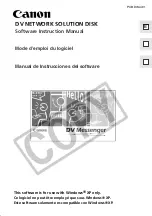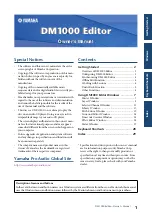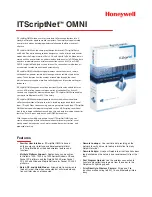
User Datagram
Protocol (UDP)
UDP is a protocol in the TCP/IP protocol suite that enables an application program to send
datagrams to other application programs on a remote machine. UDP provides an unreliable
and connectionless datagram service and does not guarantee delivery or duplicate detection;
it does not use acknowledgments, or control the order of arrival.
User Interface (UI)
The NSM graphical User Interface (UI) is used to control the NSM system. Using the UI, you
can configure NSM administrators, add devices, edit policies, view reports, and so on.
User Object
User objects represent the users of your managed devices. You can include user objects or
groups in security policies or VPNs to permit or deny access to individuals or groups.
V
View
A view is an admin-defined subset of column settings and filters in the Log Viewer.
Virtual Chassis
Stacked EX Series devices functioning as one logical EX Series switch or an SRX cluster
represented in NSM as a virtual chassis..
Virtual IP Address
A VIP address maps traffic received at one IP address to another address based on the
destination port number in the packet header.
Virtual Link
A logical path from a remote OSPF area to the backbone area.
Virtual Local Area
Network (VLAN)
A VLAN is a logical rather than physical grouping of devices that constitute a single broadcast
domain. VLAN members are not identified by their location on a physical subnetwork but
through the use of tags in the frame headers of their transmitted data. VLANs are described
in the IEEE 802.1Q standard.
Virtual Private
Network (VPN)
A VPN is an easy, cost-effective and secure way for corporations to provide telecommuters
and mobile professionals local dial-up access to their corporate network or to another Internet
Service Provider (ISP). Secure private connections over the Internet are more cost-effective
than dedicated private lines. VPNs are possible because of technologies and standards such
as tunneling, screening, encryption, and IPSec.
Virtual Router (VR)
A virtual router is the component of ScreenOS that performs routing functions. By default, a
security device contains two virtual routers: Untrust-VR and Trust-VR.
Virtual Security Device
(VSD)
A VSD is a single logical device composed by a set of physical security devices.
Virtual Security
Interface (VSI)
A VSI is a logical entity at layer 3 that is linked to multiple layer 2 physical interfaces in a VSD
group. The VSI binds to the physical interface of the device acting as master of the VSD group.
The VSI shifts to the physical interface of another device in the VSD group if there is a failover
and it becomes the new master.
Virtual System (VSYS)
A virtual system is a subdivision of the main system that appears to the user to be a standalone
entity. Virtual Systems reside separately from each other. Each one can be managed by its
own Virtual System Administrator.
Copyright © 2010, Juniper Networks, Inc.
846
Network and Security Manager Administration Guide
Summary of Contents for NETWORK AND SECURITY MANAGER 2010.3
Page 6: ...Copyright 2010 Juniper Networks Inc vi...
Page 36: ...Copyright 2010 Juniper Networks Inc xxxvi Network and Security Manager Administration Guide...
Page 52: ...Copyright 2010 Juniper Networks Inc 2 Network and Security Manager Administration Guide...
Page 90: ...Copyright 2010 Juniper Networks Inc 40 Network and Security Manager Administration Guide...
Page 144: ...Copyright 2010 Juniper Networks Inc 94 Network and Security Manager Administration Guide...
Page 146: ...Copyright 2010 Juniper Networks Inc 96 Network and Security Manager Administration Guide...
Page 234: ...Copyright 2010 Juniper Networks Inc 184 Network and Security Manager Administration Guide...
Page 310: ...Copyright 2010 Juniper Networks Inc 260 Network and Security Manager Administration Guide...
Page 364: ...Copyright 2010 Juniper Networks Inc 314 Network and Security Manager Administration Guide...
Page 366: ...Copyright 2010 Juniper Networks Inc 316 Network and Security Manager Administration Guide...
Page 478: ...Copyright 2010 Juniper Networks Inc 428 Network and Security Manager Administration Guide...
Page 576: ...Copyright 2010 Juniper Networks Inc 526 Network and Security Manager Administration Guide...
Page 580: ...Copyright 2010 Juniper Networks Inc 530 Network and Security Manager Administration Guide...
Page 592: ...Copyright 2010 Juniper Networks Inc 542 Network and Security Manager Administration Guide...
Page 684: ...Copyright 2010 Juniper Networks Inc 634 Network and Security Manager Administration Guide...
Page 690: ...Copyright 2010 Juniper Networks Inc 640 Network and Security Manager Administration Guide...
Page 696: ...Copyright 2010 Juniper Networks Inc 646 Network and Security Manager Administration Guide...
Page 698: ...Copyright 2010 Juniper Networks Inc 648 Network and Security Manager Administration Guide...
Page 748: ...Copyright 2010 Juniper Networks Inc 698 Network and Security Manager Administration Guide...
Page 778: ...Copyright 2010 Juniper Networks Inc 728 Network and Security Manager Administration Guide...
Page 870: ...Copyright 2010 Juniper Networks Inc 820 Network and Security Manager Administration Guide...
Page 872: ...Copyright 2010 Juniper Networks Inc 822 Network and Security Manager Administration Guide...
Page 898: ...Copyright 2010 Juniper Networks Inc 848 Network and Security Manager Administration Guide...
Page 908: ...Copyright 2010 Juniper Networks Inc 858 Network and Security Manager Administration Guide...
Page 910: ...Copyright 2010 Juniper Networks Inc 860 Network and Security Manager Administration Guide...
Page 995: ...PART 6 Index Index on page 947 945 Copyright 2010 Juniper Networks Inc...
Page 996: ...Copyright 2010 Juniper Networks Inc 946 Network and Security Manager Administration Guide...
















































